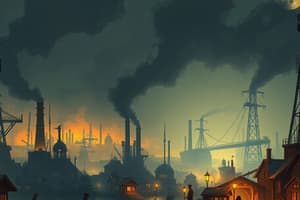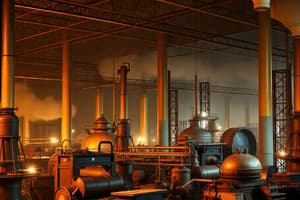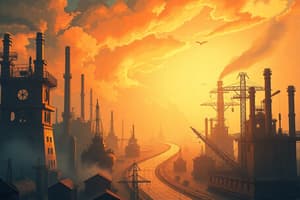Podcast
Questions and Answers
Quel est un des apports de l'impérialisme européen à la révolution industrielle ?
Quel est un des apports de l'impérialisme européen à la révolution industrielle ?
- L'augmentation des famines en Europe
- L'isolement des économies locales
- L'ouverture sur des cultures non-européennes (correct)
- La diminution des échanges commerciaux
Pourquoi la thèse du développement économique européen par le pillage est-elle polémique ?
Pourquoi la thèse du développement économique européen par le pillage est-elle polémique ?
- Elle ignore le rôle des ressources locales dans l'industrialisation
- Elle accorde trop de crédit aux économies autarciques
- Elle ne prend pas en compte l'impact des colonies sur le commerce européen (correct)
- Elle sous-estime l'importance de l'esclavage (correct)
Quel effet l'impérialisme a-t-il eu sur les pays conquis par l'Europe pendant la révolution industrielle ?
Quel effet l'impérialisme a-t-il eu sur les pays conquis par l'Europe pendant la révolution industrielle ?
- Ils ont été enrichis sans conséquences négatives
- Ils sont devenus des puissances industrielles majeures
- Ils ont subi des effets délétères et durables (correct)
- Ils ont connu une prospérité économique similaire à l'Europe
Quelle était la situation des famines en Europe occidentale après 1780 ?
Quelle était la situation des famines en Europe occidentale après 1780 ?
Qu'est-ce que la 'grande divergence' désigne dans le contexte de l'impérialisme européen ?
Qu'est-ce que la 'grande divergence' désigne dans le contexte de l'impérialisme européen ?
Quel impact a eu l'importation de nouvelles drogues pendant la révolution industrielle ?
Quel impact a eu l'importation de nouvelles drogues pendant la révolution industrielle ?
Pourquoi les puissances impérialistes européennes n'ont-elles pas toujours été considérées comme des leaders économiques ?
Pourquoi les puissances impérialistes européennes n'ont-elles pas toujours été considérées comme des leaders économiques ?
Quel facteur a particulièrement contribué à la polarisation des flux économiques par les Européens ?
Quel facteur a particulièrement contribué à la polarisation des flux économiques par les Européens ?
Quel produit a été fortement exporté vers les colonies au cours de la révolution industrielle ?
Quel produit a été fortement exporté vers les colonies au cours de la révolution industrielle ?
Quelle était l'une des raisons de la prospérité de l'Eurasie sous l'empire mongol ?
Quelle était l'une des raisons de la prospérité de l'Eurasie sous l'empire mongol ?
Quelle opinion générale est défendue concernant le développement européen par rapport aux autres puissances ?
Quelle opinion générale est défendue concernant le développement européen par rapport aux autres puissances ?
Quel impact la révolution industrielle a-t-elle eu sur la consommation des produits en Europe ?
Quel impact la révolution industrielle a-t-elle eu sur la consommation des produits en Europe ?
Comment l'impérialisme a-t-il affecté la capacité des pays colonisés à se développer ?
Comment l'impérialisme a-t-il affecté la capacité des pays colonisés à se développer ?
Quel rôle les chirurgiens de marine ont-ils joué pendant cette période ?
Quel rôle les chirurgiens de marine ont-ils joué pendant cette période ?
Quel a été un des éléments-clés du grand commerce au XVIIIe siècle?
Quel a été un des éléments-clés du grand commerce au XVIIIe siècle?
Qu'est-ce qui a provoqué la fin de la traite négrière selon le contenu?
Qu'est-ce qui a provoqué la fin de la traite négrière selon le contenu?
Quelles étaient les conséquences de l'impérialisme sur le sous-développement?
Quelles étaient les conséquences de l'impérialisme sur le sous-développement?
Quel produit n’a pas été mentionné comme bénéficiaire du travail forcé après la traite esclavagiste?
Quel produit n’a pas été mentionné comme bénéficiaire du travail forcé après la traite esclavagiste?
Qu’est-ce qui a caractérisé le commerce extérieur des pays colonisés?
Qu’est-ce qui a caractérisé le commerce extérieur des pays colonisés?
Quel pays a connu une abolition de l'esclavage lors de la Révolution haïtienne?
Quel pays a connu une abolition de l'esclavage lors de la Révolution haïtienne?
Quelle a été l'espérance de vie approximative vers 1800?
Quelle a été l'espérance de vie approximative vers 1800?
Quelle infrastructure est utilisée pour décrire le retard de développement dans les colonies?
Quelle infrastructure est utilisée pour décrire le retard de développement dans les colonies?
Quel pays avait un commerce d'exportation vers les colonies très élevé autour de 1913?
Quel pays avait un commerce d'exportation vers les colonies très élevé autour de 1913?
À quel événement Alfred Sauvy se réfère-t-il pour introduire le terme 'tiers-monde'?
À quel événement Alfred Sauvy se réfère-t-il pour introduire le terme 'tiers-monde'?
Quel effet la Révolution industrielle a-t-elle eu sur l'espérance de vie?
Quel effet la Révolution industrielle a-t-elle eu sur l'espérance de vie?
Quel aspect n'est pas un résultat de l'impérialisme selon le contenu?
Quel aspect n'est pas un résultat de l'impérialisme selon le contenu?
Quel élément décrit la structure économique des pays colonisés?
Quel élément décrit la structure économique des pays colonisés?
Quel pays asiatique est mentionné comme victime de traités inégaux?
Quel pays asiatique est mentionné comme victime de traités inégaux?
Flashcards
Les besoins de l'essor industriel européen
Les besoins de l'essor industriel européen
L'essor industriel anglais et européen conduit à la recherche de matières premières pour alimenter les industries nationales et de débouchés pour les produits finis. Un flux constant de facteurs de production est ainsi mis en place.
La traite négrière
La traite négrière
La traite atlantique continue jusqu'aux alentours de 1850, tandis que la traite de proximité persiste dans certaines régions jusqu'à son abolition complète au 20ème siècle.
L'émigration européenne
L'émigration européenne
L'émigration européenne, surtout vers l'Amérique, atteint un pic durant le 19ème siècle en raison des booms démographiques liés à la révolution industrielle et des crises économiques en Europe.
Les matières premières de l'impérialisme
Les matières premières de l'impérialisme
Signup and view all the flashcards
Les apports directs de l'impérialisme
Les apports directs de l'impérialisme
Signup and view all the flashcards
Les apports indirects de l'impérialisme
Les apports indirects de l'impérialisme
Signup and view all the flashcards
L'impact de l'impérialisme sur les prix
L'impact de l'impérialisme sur les prix
Signup and view all the flashcards
Les gagnants et les perdants de l'impérialisme
Les gagnants et les perdants de l'impérialisme
Signup and view all the flashcards
L'impérialisme a-t-il financé la Révolution Industrielle ?
L'impérialisme a-t-il financé la Révolution Industrielle ?
Signup and view all the flashcards
L'internationalisation économique et la Révolution Industrielle
L'internationalisation économique et la Révolution Industrielle
Signup and view all the flashcards
L'impact des produits coloniaux sur la consommation européenne.
L'impact des produits coloniaux sur la consommation européenne.
Signup and view all the flashcards
L'impact inégal de la Révolution Industrielle.
L'impact inégal de la Révolution Industrielle.
Signup and view all the flashcards
La "grande divergence"
La "grande divergence"
Signup and view all the flashcards
L'exploitation coloniale
L'exploitation coloniale
Signup and view all the flashcards
La polarisation des flux économiques
La polarisation des flux économiques
Signup and view all the flashcards
Le contrôle de l'innovation et de la concurrence
Le contrôle de l'innovation et de la concurrence
Signup and view all the flashcards
Le contrôle des flux commerciaux et financiers
Le contrôle des flux commerciaux et financiers
Signup and view all the flashcards
L'impact de l'impérialisme sur le sous-développement
L'impact de l'impérialisme sur le sous-développement
Signup and view all the flashcards
L'impérialisme et la création de nouveaux marchés
L'impérialisme et la création de nouveaux marchés
Signup and view all the flashcards
L'impérialisme et la grande divergence
L'impérialisme et la grande divergence
Signup and view all the flashcards
Le double impact de l'impérialisme
Le double impact de l'impérialisme
Signup and view all the flashcards
La R.I. et l'impérialisme : forces motrices de la divergence
La R.I. et l'impérialisme : forces motrices de la divergence
Signup and view all the flashcards
Les effets durables de l'impérialisme
Les effets durables de l'impérialisme
Signup and view all the flashcards
L'évolution de l'enfance
L'évolution de l'enfance
Signup and view all the flashcards
L'émergence de la jeunesse
L'émergence de la jeunesse
Signup and view all the flashcards
Les nouvelles catégories d'âge de la jeunesse dans les pays riches
Les nouvelles catégories d'âge de la jeunesse dans les pays riches
Signup and view all the flashcards
L'évolution des inégalités hommes-femmes
L'évolution des inégalités hommes-femmes
Signup and view all the flashcards
L'évolution de la maternité
L'évolution de la maternité
Signup and view all the flashcards
L'évolution de la santé maternelle
L'évolution de la santé maternelle
Signup and view all the flashcards
L'évolution de la rémunération et de la carrière des femmes
L'évolution de la rémunération et de la carrière des femmes
Signup and view all the flashcards
La croissance de la population âgée
La croissance de la population âgée
Signup and view all the flashcards
La diversité de la population âgée
La diversité de la population âgée
Signup and view all the flashcards
Les changements physiques de l'humanité
Les changements physiques de l'humanité
Signup and view all the flashcards
L'augmentation de la taille humaine
L'augmentation de la taille humaine
Signup and view all the flashcards
L'augmentation du poids humain
L'augmentation du poids humain
Signup and view all the flashcards
L'augmentation des métissages de population
L'augmentation des métissages de population
Signup and view all the flashcards
La baisse des capacités physiques des jeunes
La baisse des capacités physiques des jeunes
Signup and view all the flashcards
L'impact économique de l'esclavage sur les économies européennes
L'impact économique de l'esclavage sur les économies européennes
Signup and view all the flashcards
Fin de la traite négrière
Fin de la traite négrière
Signup and view all the flashcards
Persistance du travail forcé
Persistance du travail forcé
Signup and view all the flashcards
Impact de l'impérialisme sur le développement des pays extra-européens
Impact de l'impérialisme sur le développement des pays extra-européens
Signup and view all the flashcards
La « grande divergence » et l'émergence du tiers-monde
La « grande divergence » et l'émergence du tiers-monde
Signup and view all the flashcards
Commerce extérieur des pays colonisés
Commerce extérieur des pays colonisés
Signup and view all the flashcards
Conséquences de la spécialisation dans le commerce extérieur
Conséquences de la spécialisation dans le commerce extérieur
Signup and view all the flashcards
Impact des infrastructures sur le développement économique
Impact des infrastructures sur le développement économique
Signup and view all the flashcards
Dépendance commerciale unilatérale
Dépendance commerciale unilatérale
Signup and view all the flashcards
Impact anthropologique de la Révolution industrielle
Impact anthropologique de la Révolution industrielle
Signup and view all the flashcards
L'héritage de l'impérialisme
L'héritage de l'impérialisme
Signup and view all the flashcards
Impact de l'impérialisme sur les inégalités économiques
Impact de l'impérialisme sur les inégalités économiques
Signup and view all the flashcards
Impact de l'esclavage et du travail forcé
Impact de l'esclavage et du travail forcé
Signup and view all the flashcards
La « grande divergence »
La « grande divergence »
Signup and view all the flashcards
Analyse de l'impérialisme
Analyse de l'impérialisme
Signup and view all the flashcards
Study Notes
Impact of Industrial Revolution on the World's Economy and Society
- European Industrialization & Raw Materials: European industrial growth spurred a demand for raw materials to fuel industries and markets for those industries. This fueled the movement of capital and labor.
- Continued Slave Trade & European Emigration: Oceanic slave trades continued, and in some places local slave trades persisted until being abolished: the US (1865), Brazil (1888), Congo/Sao Tomé (1908), and Mauritania (1981). European emigration, mostly to the Americas, peaked during the 19th century, linked to population booms caused by the Industrial Revolution and economic crises in Europe.
- European Imperialism & Raw Materials: Europeans prioritized raw material production and transport to support their industrial expansion (18th-20th centuries): tropical agricultural products (cotton, rubber, coffee, oils), forestry products (wood, ivory), and mined products (copper, phosphates, gold, iron ore.)
- Economic Benefits of Imperialism to Europe: European imperialism directly benefited European prosperity through expanded trade and associated profits, funding naval and port infrastructure development, and acquiring gold and silver, boosting trade activity and funding further trade.
- Introduction of New Products: New goods from Asia (spices, eggplant, porcelain, silk), Americas (tomatoes, potatoes, corn, tobacco, rubber, vanilla, zucchini, peanuts, cassava), and Africa (millet, sorghum), lowered prices significantly on many new items.
- Indirect Benefits of Imperialism to Europe: Imperialism fostered scientific advances in navigation, human sciences (anthropology, ethnology, influencing cultural relativism and cultural knowledge), and medicine (new drugs like quinine, naval surgeon improvements to combat scurvy).
- Integration of Global Markets: The integration of European markets into a larger global system lessened agricultural shocks and fueled industrial growth through exports to colonies. Consumption was enriched with new goods, improving agricultural resilience in the modern period.
- Industrial Revolution and Imperialism Causation: Was imperialism a cause of the Industrial Revolution? There are opposing views on this cause and effect.
- Counterarguments to Imperialism as a Cause of the Industrial Revolution: Other empires (China, India, Ottoman Empire) were also imperialistic and militarily more powerful than Europe before the late 18th century. The pillaging of gold and silver in those earlier periods had ambiguous effects.
- European Imperialism's Negative Impacts: Europe's growth from the 18th century resulted in a vast gap in wealth and well-being between nations of the Atlantic North and the rest of the world ("great divergence").
- Polarization of Economic Flows/Colonial Impacts: Industrial-era European power greatly polarized economic flows. European nations controlled the direction of capital, labor, and raw materials towards their benefit.
- Colonial Economies & the "Colonial Pact": The economic relationship between colonies and their parent nations was unequal; often reliant on few commodity exports to the home nations and limited infrastructure development to support these exports.
- The Legacy of Slave Trade and Forced Labor: While the slave trade played a reduced role in European economies by the 1800s, forced labor persisted in colonies until the mid-20th century.
- Correlation between Colonial Exploitation and Modern Poverty: There's a (weak) correlation between historical intensity of slavery and contemporary levels of poverty in several countries in Africa.
- Emergence of the "Third World": The term "developing" nations (Third World) gained significance as a result of European colonialism and imposed unequal economic treaties throughout the 19th century, and only a few nations outside of Europe/North America industrialized before 1960.
- Asymmetrical Trade Relations: Colonial economies were often highly specialized in a limited range of exports, chosen by the colonial power. This created asymmetrical trade relationships and limited regional economic integration.
- Impact of Colonial Infrastructure: The design of railway networks often differed between industrialized nations and their overseas colonies, creating differences in development.
- Unilateral Commercial Dependence: Colonies relied almost exclusively on their colonizers for imports and exports.
- Comparative Trade Statistics (1913): Data show extreme differences in the proportion of imports/exports between colonies and their colonial powers.
Anthropologic Transformations Due to the Industrial Revolution
- Improved Life Expectancy: Life expectancy significantly increased – from roughly 35 years in 1800 to over 70 in current times. Population growth is increasingly due to longer lifespans and less to birthrates.
- Shifting Perceptions of Different Life Stages: Childhood, youth, womanhood, and old age have different meanings and impacts in the modern era.
- Value of Childhood in the Modern Era: Childhood became more valued and children are viewed as individuals with rights, rather than as commodities or dependents.
- Emergence of Youthful Identity: A new age of youthfulness emerged after World War II, linked to a growth in formal education and delaying entry into work/family life.
- Gender Inequality and Rights: Gender inequalities were more visible and contested during industrialization, as it became harder for women to achieve autonomy.
- Maternal Health & Childbearing: Maternal health improved, leading to a later average age for first pregnancies and lower wanted fertility rates. While the gap in women's health and wages continues to exist, progress in maternal mortality is significant (France: 1946- ~116 deaths per 100,000 births to current ~10 deaths per 100,000 births).
- Aging Population: An aging society (over 60 years of age) is becoming more widespread. Older adults are no longer categorized solely based on frailty or poverty, but also include more robust health and capabilities.
- Physical Characteristics: Physical human traits, including stature, weight, and overall physique, are changing rapidly, driven by aging populations, dietary changes, increased global population mixing, declining physical abilities in some populations, and global migration patterns.
Studying That Suits You
Use AI to generate personalized quizzes and flashcards to suit your learning preferences.
Description
Ce quiz explore l'impact de la Révolution industrielle sur l'économie et la société mondiales. Il aborde la demande accrue de matières premières, les conséquences du commerce des esclaves et l'émigration européenne. Découvrez comment ces facteurs ont façonné le monde moderne.




